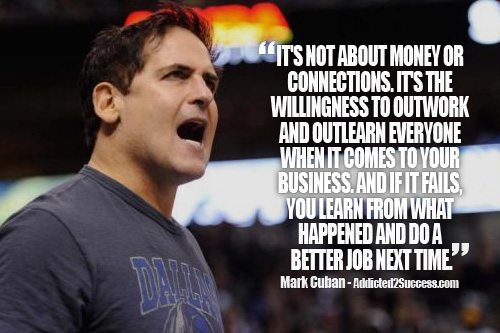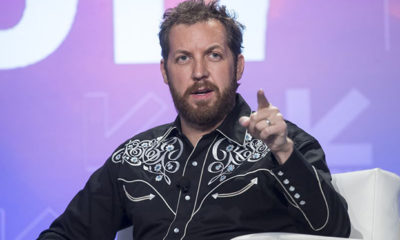Success Advice
10 Reasons Why Mark Cuban Is Worth Billions of Dollars
Mark Cuban has successfully built and sold multiple businesses over the years. He is worth an estimated $2.5 billion after selling his business “Broadcast.com” for $5.9 billion in Yahoo stock and also is the owner of the Dallas Mavericks NBA Basketball team, Landmark Theatres and Magnolia Pictures.
Cuban is a self made billionaire and is a great example of how you can construct a successful business from the ground up.
Here are ten of the most important reasons why Mark Cuban is a super successful entrepreneur.
What Makes Mark Cuban So Successful
1) Cuban Knows How To Sell
Mark Cuban has the saying “sales cure all”. What this means is that if a business is struggling the real cause can invariably be traced back to a lack of sales. Cuban said he learned this important lesson when he was working for “Your Business Software“. Cuban closed a deal for $15,000 that he had been told by his CEO not to do. His boss was furious and this deal ended Cubans job at the company.
Cuban realized that although the CEO of the company might be in charge he didn’t know how to sell and that this was his weakness and could possibly be one of Cubans newly found strengths.
2) He Is Good At Spotting Potential
When Mark was starting out with “MircroSolutions” he once visited a business called “PCDirect”. Talking to the young owner of the business he was impressed by his vision and talent. He told the young man that he thought they were both going places. That young man was Michael Dell, and Michael Dell’s future, well became quite amazing as he earned billions and secured a spot between the big boys Apple & Microsoft in the market.
As a venture capitalist Cuban continues to look for that potential for greatness and is even featured on the Startup Investor TV Show on ABC called Shark Tank, where he invests in new ideas and ventures that he sees great potential in.
3) He Understands That He MUST Work Harder Than The Next Guy
The one thing that you can control is your work ethic and Mark makes sure that he is a beast in his field. Cuban says that you need to know the industry that you are in better than anyone else, to study, live and breathe it.
Earlier in his career when he was first working for MicroSolutions he was making around $60,000 a year. He was doing well but he wanted more. Cuban says he dedicated himself to learning everything he could so that he would be able to get an edge over his competitors. More recently Cuban says that he spends as much time as he can reading everything and anything about the cable industry. Cuban is always on the hunt to be the expert in his industry.
He understands that persistence most definitely pays off.
Sweat equity is the most valuable equity there is. Know your business and industry better than anyone else in the world. Love what you do or don’t do it. – Mark Cuban
4) Mark Cuban Focuses On REAL Results
While Cuban strongly believes in the importance of having a strong work ethic, he also suggests that we need to focus where we direct our energy. Working to produce real results is far more important than working simply for the sake of it.
He is also skeptical about start-ups who waste their money. He says if he receives too much “swag” from a company then he is immediately suspicious about how they are allocating their resources.

5) He Is Always Looking For Long Term Business Relationships
Cuban advises businesses not to be too focused on squeezing the maximum profit out of a single deal at the expense of the relationship with that customer. Real value for a company is created by maximizing the life time value of the customer.
As Cuban points out, business relationships are built over years, not on a single deal.
6) He Always Learns On The Job
If you are willing to learn your job can pay you twice.
– Firstly there is the money that you receive for working your job.
– Secondly there is the knowledge that you gain from working at your company.
This second form of payment is in Cubans opinion the most important one. When Cuban first started out working at “Your Business Software” he was only making $18,000 a year. But more importantly he was learning about the PC industry and how to sell. It was this knowledge that would allow him to build MicroSolutions into a company that did $30 million in sales only a few years later.
He took the risks when necessary and kept his eyes on the prize ahead of him, he discovered that he must always strive “to learn, create and grow.”
Because if you’re prepared and you know what it takes, it’s not a risk. You just have to figure out how to get there. There is always a way to get there. – Mark Cuban
7) Cuban Extends Himself To Get A Customer
Mark Cuban’s first customer was the $15,000 deal that lost him his job working at “Your Business Software“. After losing his job he went to the customer and asked if he could do the job for him personally. The client agreed and it launched MicroSolutions.
For his first clients Cuban would take no money for providing the service, the client was only charged for the software. Cuban did this because he realized that customers only want to work with you if you already have other customers and a great reputation.
8) He Doesn’t Believe In Hierarchy
Mark Cuban keeps a careful eye out for people he perceives as being “Empire Builders”.
These are senior executives who don’t want to make sales calls and require lots of perks. He believes in making the organizational structure as flat as possible. He also says that open offices work best and that executives should not be able to lock themselves away.

9) He Builds Companies To Last
Mark believes that many entrepreneurs are too focused on the idea of an exit strategy. He believes that the best way to build a company that will sell for a great price is to build a company that is designed to last. He also remarks that if you have your eyes on the exit then the company is not enough of an obsession for you.
10) He Knows When To Sell
Mark Cuban built his businesses because of his relentless sales drive and persistence, but he also become a billionaire because he knew the best time to sell. This has proven to be the key in many industries, many times over. Cuban sold Broadcast.com to Yahoo in 1999 for $5.9 billion in stock. One year later following the dot com crash the company’s value was worth a fraction of that.
He cashed out when the deal was good and didn’t hang on too long in hopes for a greedy “more”. Know when to sell, and learn when to walk away from something you feel does not do a sale justice either. Mark has mastered this and it has rewarded him dearly.
Mark Cuban is the definition of a hard working entrepreneur who isn’t afraid to hustle. Learn how to adopt some of his winning success traits and you may have what it takes to build your own fortune.
Business
If Your Business Internet Keeps Letting You Down, Read This
From smoother operations to better security, dedicated internet access is quietly powering today’s high-performing businesses.

Today, a dependable internet service is the bedrock for uninterrupted business operations. Many organizations rely on stable online connections for communication, data transfer, and customer interaction. (more…)
Did You Know
How Skilled Migrants Are Building Successful Careers After Moving Countries
Behind every successful skilled migrant career is a mix of resilience, strategy, and navigating systems built for locals.

Moving to a new country for work is exciting, but it can also be unnerving. Skilled migrants leave behind familiar systems, networks, and support to pursue better job opportunities and a better future for their families. (more…)
Life
10 Research-Backed Steps to Create Real Change This New Year
This New Year could finally be the one where you break old patterns and create real, lasting change.

Every New Year, we make plans and set goals, but often repeat old patterns. (more…)
Change Your Mindset
The Silent Skill That Makes People Respect You Instantly
What truly earns respect and why most people go about it the wrong way

Everybody craves respect but not everyone earns it. Some people believe that a title, years of experience, or a position of authority automatically entitles them to respect. (more…)
-

 Health & Fitness1 week ago
Health & Fitness1 week agoWhat Minimalism Actually Means for Your Wellness Choices
-

 Did You Know1 week ago
Did You Know1 week agoWhy Most Online Courses Fail and How to Fix Them
-

 Business1 week ago
Business1 week agoIf Your Business Internet Keeps Letting You Down, Read This
-

 News5 days ago
News5 days agoBrandon Willington Builds 7-Figure Business by Ignoring Almost Everything
























8 Comments